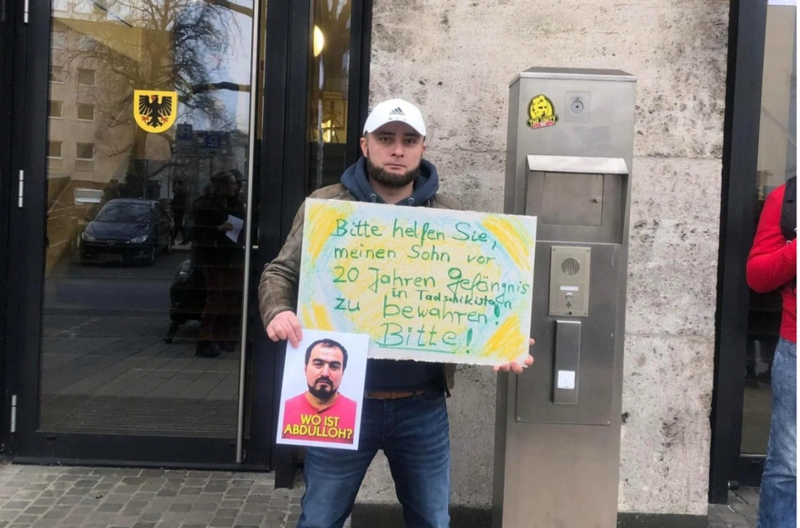Dilmurod Ergashev taking part in a demonstration in Berlin on Dec. 23, 2022, in support of Abdullohi Shamsiddin, who was detained and later deported to Tajikistan in January 2023 / Photo: Sharofiddin Gadoev
Opposition activist Dilmurod Ergashev was recently deported from Germany to his home country of Tajikistan. Upon landing at the airport in Dushanbe, Ergashev was taken directly to an interrogation room by security officials, who covered his head with a bag. The following day, a closed court session held without legal counsel ruled that the activist could be held in detention for two-months. Sharofiddin Gadoev, an opposition leader and chairman of the Europe-based Reforms and Development of Tajikistan movement, informed The Insider about these developments, citing an unnamed source with knowledge of the matter.
The Sino District Court in Dushanbe issued Ergashev’s detention order on Nov. 8, 2024. Both the case and the proceedings were classified. Following the court's decision, the activist was transferred to a pretrial detention facility run by the GKNB (the State Committee for National Security), said the source.
Gadoev's source reported that Ergashev was interrogated by the GKNB in a room outfitted with electric shock devices and other torture tools. The source suspects that he was tortured during the interrogation, and that he was also denied necessary medical assistance.
The source further described a technique used at the detention center known as the “zero form” — a procedure in which every new arrival is subjected to severe torture during their initial inspection, medical examination, and cell assignment. Gadoev noted that the GKNB facility is notorious for employing harsh and systematic torture methods, with political detainees facing additional abuse and humiliation from its staff.
Gadoev's source asserted that when Ergashev was handed over to Tajik security forces at the airport in Dushanbe, they placed a bag over his head and forcibly dragged him into a vehicle in front of the German police. The source described the detainee as appearing “physically exhausted.” The Insider's editorial team has submitted a request to the German Ministry of the Interior to question the officers who handed Ergashev over to GKNB officials in Dushanbe, but has not yet received a response.
Ergashev was detained in Germany on Oct. 28 of this year and taken to the administrative court in the town of Kleve, near the country's border with the Netherlands, where he was placed in custody. On the same day, the court ruled to deport him to Tajikistan between November 5 and 7 — despite the fact his asylum request was still pending at another administrative court.
On the day of his deportation, fearing torture and imprisonment upon his return to Tajikistan, Ergashev attempted suicide. German police officers arriving at the deportation center to escort him to Düsseldorf Airport found him in his cell lying in a pool of blood. Despite his suicide attempt and critical health condition, he was still put on a plane back to Dushanbe.
Ergashev, 40, has been an active member of the opposition movement Group 24, which is banned in Tajikistan, Gadoev noted. He took part in numerous peaceful protests, such as demonstrations outside Tajikistan’s embassy in Berlin in April 2015, on Dec. 10, 2018, and Sept. 28–29, 2023 — along with events in other German cities. Ergashev has been a vocal critic of Emomali Rahmon’s regime, distributing posts on social media, advocating for democratic values, and defending human rights, the activist said. Since the formation of the Reforms and Development of Tajikistan movement on Mar. 15, 2018, Ergashev has remained an active member of the group, volunteering to support its initiatives, Gadoev added.
Ergashev applied for political asylum in Germany in February 2011. Despite ample evidence of his persecution in Tajikistan, his application remained unaddressed for over 13 years.

